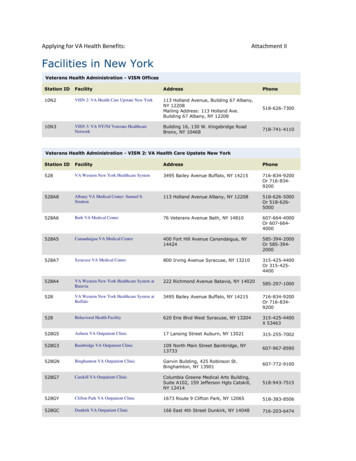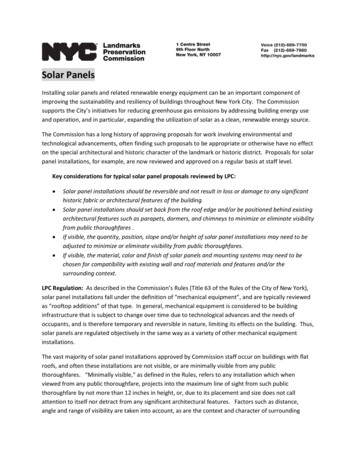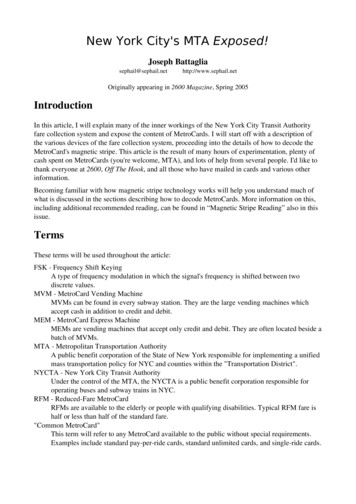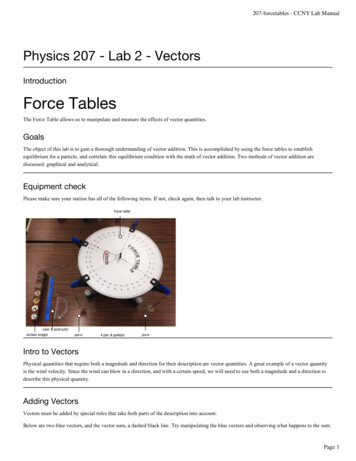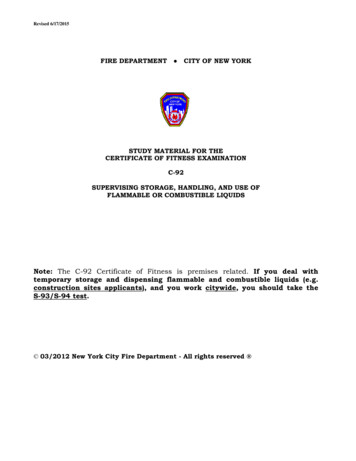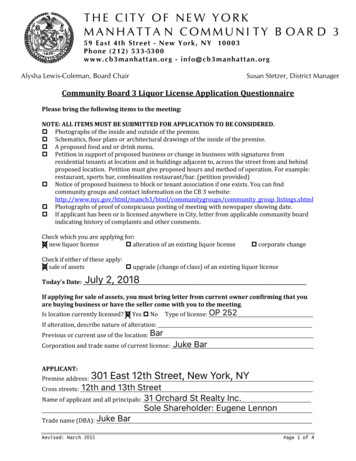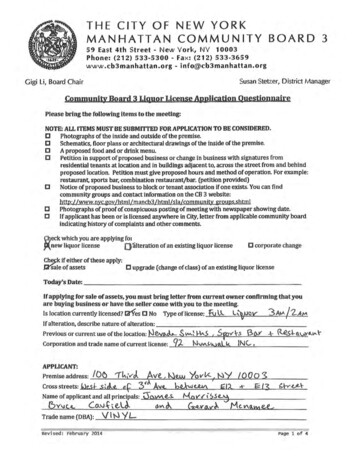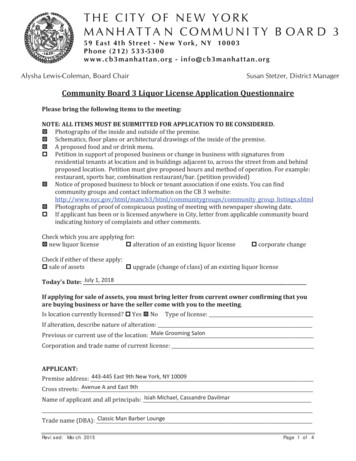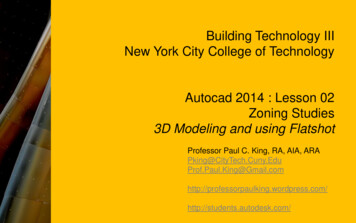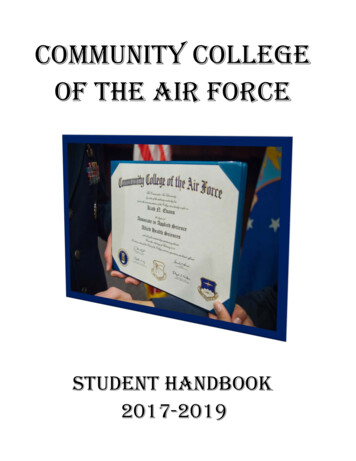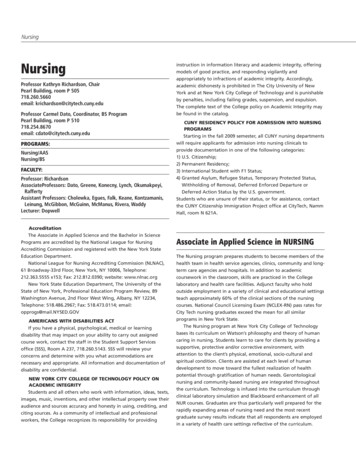
Transcription
NursingNursingProfessor Kathryn Richardson, ChairPearl Building, room P 505718.260.5660email: krichardson@citytech.cuny.eduProfessor Carmel Dato, Coordinator, BS ProgramPearl Building, room P 510718.254.8670email: /BSFACULTY:Professor: RichardsonAssociateProfessors: Dato, Greene, Konecny, Lynch, Okumakpeyi,RaffertyAssistant Professors: Cholewka, Egues, Falk, Keane, Kontzamanis,Leinung, McGibbon, McGuinn, McManus, Rivera, WaddyLecturer: DopwellAccreditationThe Associate in Applied Science and the Bachelor in SciencePrograms are accredited by the National League for NursingAccrediting Commission and registered with the New York StateEducation Department.National League for Nursing Accrediting Commission (NLNAC),61 Broadway-33rd Floor, New York, NY 10006, Telephone:212.363.5555 x153; Fax: 212.812.0390; website: www.nlnac.orgNew York State Education Department, The University of theState of New York, Professional Education Program Review, 89Washington Avenue, 2nd Floor West Wing, Albany, NY 12234,Telephone: 518.486.2967; Fax: 518.473.0114; email:opprogs@mail.NYSED.GOVAMERICANS WITH DISABILITIES ACTIf you have a physical, psychological, medical or learningdisability that may impact on your ability to carry out assignedcourse work, contact the staff in the Student Support Servicesoffice (SSS), Room A 237, 718.260.5143. SSS will review yourconcerns and determine with you what accommodations arenecessary and appropriate. All information and documentation ofdisability are confidential.NEW YORK CITY COLLEGE OF TECHNOLOGY POLICY ONACADEMIC INTEGRITYStudents and all others who work with information, ideas, texts,images, music, inventions, and other intellectual property owe theiraudience and sources accuracy and honesty in using, crediting, andciting sources. As a community of intellectual and professionalworkers, the College recognizes its responsibility for providinginstruction in information literacy and academic integrity, offeringmodels of good practice, and responding vigilantly andappropriately to infractions of academic integrity. Accordingly,academic dishonesty is prohibited in The City University of NewYork and at New York City College of Technology and is punishableby penalties, including failing grades, suspension, and expulsion.The complete text of the College policy on Academic Integrity maybe found in the catalog.CUNY RESIDENCY POLICY FOR ADMISSION INTO NURSINGPROGRAMSStarting in the fall 2009 semester, all CUNY nursing departmentswill require applicants for admission into nursing clinicals toprovide documentation in one of the following categories:1) U.S. Citizenship;2) Permanent Residency;3) International Student with F1 Status;4) Granted Asylum, Refugee Status, Temporary Protected Status,Withholding of Removal, Deferred Enforced Departure orDeferred Action Status by the U.S. government.Students who are unsure of their status, or for assistance, contactthe CUNY Citizenship Immigration Project office at CityTech, NammHall, room N 621A.Associate in Applied Science in NURSINGThe Nursing program prepares students to become members of thehealth team in health service agencies, clinics, community and longterm care agencies and hospitals. In addition to academiccoursework in the classroom, skills are practiced in the Collegelaboratory and health care facilities. Adjunct faculty who holdoutside employment in a variety of clinical and educational settingsteach approximately 60% of the clinical sections of the nursingcourses. National Council Licensing Exam (NCLEX-RN) pass rates forCity Tech nursing graduates exceed the mean for all similarprograms in New York State.The Nursing program at New York City College of Technologybases its curriculum on Watson’s philosophy and theory of humancaring in nursing. Students learn to care for clients by providing asupportive, protective and/or corrective environment, withattention to the client’s physical, emotional, socio-cultural andspiritual condition. Clients are assisted at each level of humandevelopment to move toward the fullest realization of healthpotential through gratification of human needs. Gerontologicalnursing and community-based nursing are integrated throughoutthe curriculum. Technology is infused into the curriculum throughclinical laboratory simulation and Blackboard enhancement of allNUR courses. Graduates are thus particularly well prepared for therapidly expanding areas of nursing need and the most recentgraduate survey results indicate that all respondents are employedin a variety of health care settings reflective of the curriculum.
NursingProgram Outcomes: Incorporate knowledge and skills gained from the communicationarts, information technology and the social and biologicalsciences into nursing practice. Utilize the caring model to safely meet the health needs of clientsof all ages in a variety of settings. Apply the nursing process as a creative problem solving approachin the delivery of client-centered care to culturally diverse clients. Incorporate evidence-based practice using critical thinking indecision-making situations when caring for clients. Incorporate effective communication in interactions with clients,families, significant others and health care providers. Implement client/family health teaching along the health-illnesshealing continuum. Collaborate with clients, families, significant others and healthcare providers in creating a protective, supportive and/orcorrective environment for clients. Incorporate legal and ethical principles into safe nursing practice. Demonstrate accountability by utilizing quality improvementconcepts in the management of care. Function as a client advocate in the health care system. Continue life long learning activities and professional development. Maintain involvement in community-based service.REGISTERED NURSE LICENSUREA license to practice as a registered professional nurse in New YorkState is granted to graduates of nursing programs approved by theState Education Department who are at least eighteen years old,are of good moral character*, and have passed the licensingexamination of the State Board of Nursing. Graduates are eligible totake the licensing examination at any time following graduation.*Part 28, DETERMINATION OF GOOD MORAL CHARACTER IN THE PROFESSIONSSection 28. 1 Determination of Good Moral Charcter.The determination of whether an applicant for authorization to practice aprofession, under title VIII of the Education Law, is of good moral character shallbe made in accordance with the procedures specified in this part.Section 28. 2 InformationAll information indicating that an applicant has been convicted of a crime, or hascommitted an act of which raises a reasonable question as to the applicant’smoral character shall be referred to the executive director of the Office ofProfessional Discipline or his or her designee.Nursing HandbookThe University of the State of New YorkThe State Education DepartmentDivision of Professional Licensing ServicesCultural Education CenterAlbany, New York 12230c 1992 p. 44Approximate Additional CostsAnnual physical examination andNYS immunization requirements*Dependent on coverageHepatitis B Vaccine is recommendedProvided at no cost by CUNYCPR Certification with AEDUniform with emblem, scrubs, shoes, scissors,watch, stethoscope 65 250Professional Liability Insurance (annual) 20Nursing Textbooks 500PDA with e-books 365Licensure Fee (NCLEX-RN) 335Standardized Exams 200* The College’s Student Health Services Center (SHSC) may be able to providethe physical examination based upon availability of appointments. (Pearlbuilding, room 104, 718.260.5910)Admission criteria into the Introductory Courses of theNursing Curriculum A high school diploma or its equivalent (GED); CUNY certification in mathematics, writing and reading; Prerequisites for BIO 2311: BIO 1101 and BIO 1101L with a minimumgrade of C, a college level General Biology Course with Lab, or ascore of 85 or above on the Biology Regents exam (with Lab).Introductory Term RequirementsPrior to clinical nursing coursework, all students must completethe 14-credit introductory sequence, with a minimum cumulativeindex (grade point average) of 2.5 in the following courses:BIO 23114 creditsAnatomy and Physiology IPSY 11013 creditsIntroduction to PsychologyENG 11013 creditsEnglish Composition IMAT 1275or higher4 creditsIntroduction to Mathematical AnalysisStudents may repeat only one of the introductory courses in order tomeet the 2.5 grade point average in the 14-credit introductory coursesequence needed for admission to the first semester nursing courses.When an introductory course grade is a D or F, the student must repeatthe course and the grade on the second attempt will be counted for theintroductory sequence. A student may not repeat a course in which theinitial grade was a C or better. When a student has received a C orbetter on more than one introductory course, the student may replaceonly one of the introductory course grades with the grade of the nextlevel course to raise their G.P.A. (ex. ENG 1121 for ENG 1101; BIO 2312for BIO 2311; PSY 2301 for PSY 1101; or MAT 1272 for MAT 1275).Students must have an overall grade point average of 2.5 to beadmitted to the first semester nursing courses. A student must havea minimum grade of “C” in each of the introductory courses with aminimum 2.5 grade point average in the 14-credit introductorycourse sequence.While the standard in the introductory sequence is the minimumstandard for consideration of advancement to the clinical phase ofthe program, it does not guarantee progression into the clinicalphase. The stronger the group of applicants in any given semester,the higher will be the index needed in the introductory sequence for
Nursingconsideration of advancement to the clinical phase of the program.Because of capacity limitations, students who have completed theintroductory phase with the minimum 2.5 index or higher will benumerically ranked each semester and seats will be allocated on thebasis of the highest cumulative average in the introductorysequence, as space permits. Due to the high number of applicants tothe clinical phase of the nursing program in the past two years, theaverage G.P.A, for acceptance to the nursing program has beenapproximately 3.0 or higher.All introductory students are required to take the NationalLeague for Nursing (NLN-RN) Pre-Assessment examination or theequivalent during the introductory semester to be used as anadditional criterion for admission. Minimum score(s) as determinedby the Nursing Department will be required for admission. Studentsmust have completed the NLN-RN exam within (5) five years of theirapplication to the clinical phase of the Nursing Program. They mustsubmit written applications that include the NLN-RN Pre-AssessmentExamination results directly to the Department of Nursing.Prior to the first clinical laboratory experience, at a datespecified by the program, students must present proof ofprofessional liability insurance coverage, CPR certification and aphysical examination utilizing the nursing department form, whichmust be updated annually to meet health care facility and nursingdepartment requirements.Progression in NursingOnce the student is admitted to NUR courses, the followingpolicies will be in effect:A minimum grade of “C” in each course designated with the prefixNUR (NUR 1010, NUR 1030, NUR 1110, NUR 1130, NUR 2110, NUR2130, NUR 2210, NUR 2230) and BIO (BIO 2312, BIO 3302) is required.Requirements for Passing Each Nursing Course A grade of satisfactory “S” in the clinical component. Completion of the National League for Nursing AchievementExamination or the equivalent. Six hours of community service per semester.Prior to the first clinical experience each semester, students mustdemonstrate competency in Med-Math to be certified as safe toadminister medications in the clinical area.For students repeating NUR 1030 only, 10% of allocated seatswill be given to repeaters. Priority selection will be based on coursenumerical grade achieved in NUR 1030.The student may repeat only two nursing courses with a clinicalcomponent (NUR 1030, NUR 1110, NUR 1130, NUR 2110, NUR 2130,NUR 2210, NUR 2230). A committee of nursing faculty will reviewrequests for waiver of this policy.All NUR courses must be passed on the second registration.On the second registration attempt for a clinical nursing course,the student will be considered for registration based on spaceavailability. Priority selection will be based on course numericalgrade achieved in the course being repeated.NUR 2210 and NUR 2230 students are required to participate inthe NCLEX-RN Advisement Program, which includes taking theCNAT and HESI Exit Exam(s).Students must pass the CUNY CPE (CUNY ProficiencyExamination) prior to graduation.Students are expected to adhere to policies as outlined in theNYCCT catalog, the NYCCT student handbook and the Departmentof Nursing student handbook.Grading Policy for all Courses Designatedwith the Prefix NURDefinitionGradePoints (Index)93-100%A4.090-92.9%A-3.787-89.9%B 3.383-86.9%B3.080-82.9%B-2.777-79.9%C 2.375-76.9%C2.060-74.9%D1.0Below 60F0.0A grade of “C” is the minimum passing grade for Nursing (NUR)courses. Students must repeat any nursing courses in which theyreceive a “D” or “F” in the theory component and/or anunsatisfactory grade in the clinical component (subject to the limitson repetition of NUR courses listed above).Transfer into the Nursing CurriculumStudents who wish to transfer into the nursing curriculum fromother college curricula must have completed the criteria forplacement in the nursing curriculum and introductory term. To beeligible for admission into the nursing program, transfer studentsfrom other colleges must be in good academic standing, not onacademic probation, not academically or administratively dismissedand not barred from continuing enrollment in the nursing programat previous college(s). Transfer students from other colleges mustbe registered at New York City College of Technology for at leastone semester prior to being ranked for entry into the clinicalnursing courses. They must meet the criteria for admission into thenursing curriculum and introductory semester, and must earn a 2.5or higher cumulative index in the introductory course sequence tobe considered for progression into the clinical program. Studentswill be numerically ranked for advancement into the clinical phaseof the program, as space permits. Any introductory coursecompleted at another college must have a letter grade forcomputation of index. To receive transfer credit for the requiredsciences, students must have completed Anatomy and Physiology Iand II, and Microbiology within five (5) years of their acceptance tothe clinical phase of the nursing program.Readmission to NursingStudents who have not registered for nursing courses for twoconsecutive semesters will be readmitted to nursing on a spaceavailable basis and the achievement of a minimum grade of 75%on a comprehensive nursing examination of previously completednursing coursework.
NursingGraduation from the Nursing ProgramA minimum cumulative grade point average of 2.0 in therequired 67 credits is necessary for graduation from the nursingprogram. The clinical nursing courses must be completed withinfive (5) years.CURRICULUM PLANCreditsFIRST YEARFirst Semester or Introductory Term1BIO 2311NURSING DEPARTMENT REQUIREMENTSThe College will grant an associate in applied science (AAS) degree witha major in nursing upon satisfactory completion of the required 67credits listed below.Anatomy and Physiology I4ENG 1101English Composition I3PSY 1101Introduction to Psychology3MAT 1275or higherIntroduction to Mathematical Analysis4Subtotal14Second Semester or TermREQUIRED COURSES IN THE MAJORCreditsNUR 1010Medication Calculations in Nursing1NUR 10101Medication Calculations in Nursing1NUR 1030Foundations of Caring (WI )6NUR 1030Foundations of Caring6BIO 2312Anatomy and Physiology II4NUR 1110Caring for Clients with Common Alterationsin Functional NeedsPSY 2301Child Psychology35Caring for Clients with Common Alterationsin Survival Needs5Caring for Clients with Complex Alterationsin Survival and Functional NeedsSECOND YEARFirst Semester or Term5NUR 1110Caring for Clients with Alterationsin Integrative NeedsCaring for Clients with CommonAlterations in Functional Needs4NUR 1130Caring for Clients with Chronic Alterationsin Human NeedsCaring for Clients with CommonAlterations in Survival Needs55BIO 3302Microbiology4Caring for Clients and Families withGrowth Seeking Needs5NUR 1130NUR 2110NUR 2130NUR 2210NUR 2230Subtotal362SubtotalSubtotal14514Second Semester or TermNUR 2110Caring for Clients with Complex Alterations inSurvival and Functional Needs (WI2)NUR 2130Caring for Clients with Alterations inIntegrative Needs4ENG 1121English Composition II33ADDITIONAL REQUIRED COURSES5BIO 23111Anatomy and Physiology I4BIO 2312Anatomy and Physiology II4BIO 3302Microbiology4ENG 1101English Composition3English Composition II3THIRD YEARFirst Semester or TermNUR 2210Caring for Clients with ChronicAlterations in Human Needs5NUR 2230Caring for Clients and Families withGrowth Seeking Needs5SOC 1101Elements of Sociology3ENG 1121MAT 1275or higherIntroduction to Mathematical Analysis4PSY 1101Introduction to Psychology3PSY 2301Child Psychology3SOC 1101Elements of Sociology32Subtotal31SubtotalSubtotalTOTAL CREDITS REQUIRED FOR THE DEGREE13671Students without the requisite science background for BIO 2311 may have totake BIO 1101 in preparation. This will increase the total number of creditsrequired for the degree by four (4).Students without the requisite math background for MAT 1275 may have totake MAT 1175 in preparation. This will increase the total number of creditsrequired for the degree by four (4).212TOTAL CREDITS REQUIRED FOR THE DEGREE67These courses must be completed successfully before taking any nursingcourses. Computer literacy is required for graduation. A self-paced process ofcertification is available through the College Learning Center at no cost to thestudent or MST 1101 (3 credit course can be taken), in addition to the 67 creditsfor the AAS in Nursing.12WI Writing IntensiveSee page ? for a detailed explanation of core-required courses andcategories.3Note: NUR courses require permission of the department for registration.
NursingBachelor of Science in NURSINGThis Bachelor of Science (BS) in Nursing degree program providesassociate degree and diploma prepared registered professionalnurses with the education and skills necessary to become leadersand managers in a variety of health care settings. Baccalaureateprepared nurses are integral collaborative members of diverseinterdisciplinary health care teams.The baccalaureate in nursing curriculum prepares nurses asgeneralists with experiences across the life span. This flexibleupper-level program provides, within a single day of the week,didactic and clinical courses to meet the needs of RN students. Inaddition to academic coursework in the classroom, studentspractice physical assessment skills in a College laboratory setting.Select clinical agencies afford students dynamic learningopportunities to expand their knowledge base in leadership,community health and urban health issues.Nurses entering the program with an associate degree in nursingfrom a credit-granting institution may have up to 60 credits of coursework that was required for the AAS degree transferred toward the120-credit BS degree (additional credits will be evaluated). Nursesseeking entrance to the program with a diploma or from aninstitution where college credit has not been granted will be requiredto take the Nursing Acceleration Challenge Exams (ACE) II RN to BS(NLN ACE II Examinations) for acceptance of previous nursing courses.The rapid expansion of information technology and thecomputer resources at New York City Co
The Nursing program at New York City College of Technology bases its curriculum on Watson’s philosophy and theory of human caring in nursing. Students learn to care for clients by providing a s
